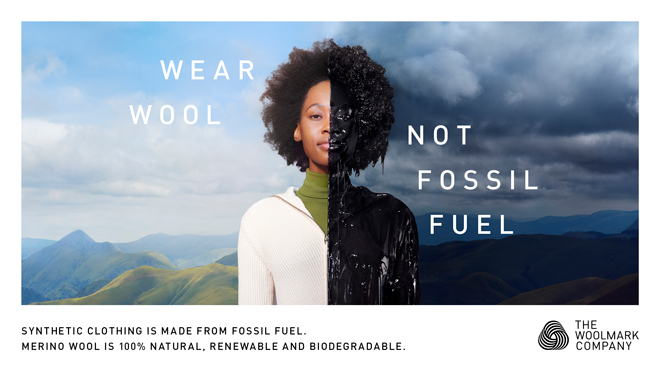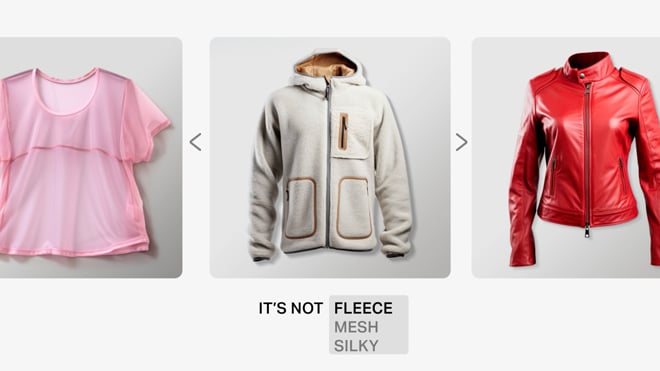Woolmark’s positive eco-campaign results

During the past two years, AWI’s marketing arm The Woolmark Company has run a powerful and successful eco-campaign to reinforce to consumers the message that synthetic fibres are made from oil, and that consumers should instead choose wool because it is a natural, renewable and biodegradable fibre.
The Woolmark Company’s eco-focused marketing campaign that ran during 2022 and 2023 has helped educate the public about the harmful impact of synthetic fibres on the environment, and that choosing a natural fibre such as wool can help reduce the fashion industry’s impact on the planet.
The campaign was launched as a response to findings from research conducted by The Woolmark Company which showed that while more than one third of global consumers said they were willing to pay more for sustainable apparel, they did not consider a product’s fibre composition when considering what garment to purchase. Furthermore, the research highlighted that consumers were not making the connection that synthetic fibres are made from fossil fuels. It is these problems that The Woolmark Company’s campaign aimed to address.

The global campaign urged consumers to consider the fibre composition of a clothing product – and choose wool – when they are thinking of making a purchase.
In the initial year (2022), the eco-campaign focussed on delivering a series of powerful visual messages through the emotive ‘Wear Wool, Not Fossil Fuel’ video that highlights the link between fabrics made from synthetic fibres and the crude oil used in its manufacture. The amazing reception of the video in 2022 resulted in The Woolmark Company running this aspect of the campaign again in 2023.
In 2023, The Woolmark Company also launched the ‘Filter by Fabric’ aspect of the eco-campaign which urges fashion brands to commit to transparent, accurate product names that reflect fabric composition. The initiative also empowers consumers to prioritise fabric impact when making purchasing decisions.
Eco-campaigns vital to support demand
AWI CEO John Roberts says The Woolmark Company’s recent eco-campaign has been aimed at helping reverse the rise of fast fashion, which is dominated by synthetic fibres such as polyester, and increase demand for long-lasting clothing made from wool.
“As a natural, renewable, biodegradable and the most recycled apparel fibre, wool is well placed to take advantage of the profound market shift towards environmentally friendly products – it is a great opportunity for wool. However, the market’s rush towards sustainability also presents a threat to wool, due to the large amount of greenwashing that is being undertaken by those brands that are heavily reliant on synthetic fibres, to make synthetic fibres appear more sustainable,” John said.
“AWI has been investing in research right across the supply chain to produce robust scientific evidence to counter this greenwashing and misinformation, and support the company’s marketing initiatives to increase the demand for wool.
“It is vital that the wool industry continues to invest in marketing to address the opportunities and threats it faces, to promote wool’s natural eco-credentials and ensure that consumers are not misled but make truly informed decision when purchasing products.
“Marketing campaigns such as our ‘Wear Wool, Not Fossil Fuel’ and ‘Filter by Fabric’ initiatives have been very successful, but the industry needs more campaigns like this in the future to continue to increase consumers’ knowledge about the attributes of different fibre types and to promote the environmental benefits of wool.”
“The company’s campaign spotlight on the eco-credentials of our nation’s fibre had an amazing reception with strong and positive results – it needs to continue to be a prominent and permanent feature of our marketing into the future as we become more proactive in driving our market’s sustainability agenda.”
- John Roberts, AWI CEO
‘Wear Wool, Not Fossil Fuel’ initiative
HIGHLIGHT RESULTS FROM THE INITIATIVE131 million 850 million 75% |
The ‘Wear Wool, Not Fossil Fuel’ aspect of the campaign centred around a 60-second impactful film that shows people struggling to escape an oil-filled swimming pool, which is a dramatic visual based on the insight that every 25 minutes an Olympic pool’s worth of crude oil is used to produce synthetic clothing (which amounts to almost 350 million barrels a year). The video then sees the people wearing wool clothes, wandering with freedom through forests, streams and meadows – a natural paradise – which emphasises the natural attributes of the wool they are now wearing.

Screenshots from the campaign film showing people ‘clothed’ in oil (wearing synthetic garments), which starkly contrasts with them later wearing wool garments in nature.
In 2022, ‘Wear Wool, Not Fossil Fuel’ was promoted via digital and social media, accompanied by visually striking 3D digital advertising in iconic sites in London’s Piccadilly Circus and New York’s Times Square, along with other global outdoor advertising (such as on bus shelters and newsstands) in the US, UK and France, plus a partnership with popular computer file transfer company WeTransfer.
In 2023, ‘Wear Wool, Not Fossil Fuel’ was again promoted via digital and social media, including high attention video environments such as YouTube and connected TV (CTV) ie delivered to a smart TV via a streaming service, along with outdoor advertising in the US, UK and France such as at stations on the New York City Subway, London Underground and Paris Metro.

The ‘Wear Wool, Not Fossil Fuel’ campaign was rolled out via outdoor advertising as well as digital and social media. Pictured is advertising on a bus shelter on Oxford Street in central London, a digital promotion in French, and giant 3D digital advertising in New York’s Times Square.
In total, the ‘Wear Wool, Not Fossil Fuel’ campaign video has been watched an incredible 131 million times. The digital campaign has received 850 million impressions (which is the number of times the campaign advert was seen online or on outdoor advertising).
Research shows that ‘Wear Wool, Not Fossil Fuel’ has been very successful, surpassing industry benchmarks, with surveyed consumers saying that it was very impactful:
- 75% expressed purchase intent for wool.
- 78% have reconsidered the environmental impact of their clothing choices.
- 80% acknowledged wool as environmentally friendly.
- 77% take fabric/materials into account when making clothing purchases.
More information: www.woolmark.com/wear-wool
‘Filter by Fabric’ initiative
As part of its eco-campaign, The Woolmark Company in 2023 also launched its ‘Filter by Fabric’ initiative that aims to help shoppers easily identify authentic wool products.
The initiative was launched in response to a YouGov survey that showed that ambiguous terms – such as ‘fleece’ and ‘silky’ – confuse clothing consumers and make it difficult for them to readily identify what a fabric is really made from, especially when synthetic materials are used to mimic natural fibres in clothing.

Ambiguous terms, such as ‘fleece’ and ‘silky’, applied to product descriptions by brands and retailers can make it difficult for consumers to understand what fibre the product is actually made from.
The aim of ‘Filter by Fabric’ is to help end this confusion. It urges fashion brands to take a pledge at www.filterbyfabric.com to commit to clear, honest product names that accurately communicate fabric composition. The initiative also encourages them to modify the functionality of their online stores so that consumers can search for apparel by fabric type (eg wool) when shopping. Consumers are also encouraged to support the initiative by taking a pledge.
To date, the ‘Filter by Fabric’ initiative has amassed 330+ media clippings, four million impressions, and more than 9,000 pledges from consumers and brand partners.
These include notable names such global fashion giant Benetton, Reformation, Cubus and Maggie Marilyn; leading Australian brands Iris & Wool, Merino Country and Albus Lumen; as well as industry bodies including IWTO, Copenhagen Fashion Week and No More Plastic.
More information: www.filterbyfabric.com
This article appeared in the June 2024 edition of AWI’s Beyond the Bale magazine. Reproduction of the article is encouraged.













